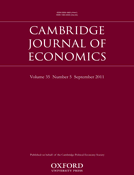-
Views
-
Cite
Cite
Michael Joffe, The root cause of economic growth under capitalism, Cambridge Journal of Economics, Volume 35, Issue 5, September 2011, Pages 873–896, https://doi.org/10.1093/cje/beq054
Close - Share Icon Share
Abstract
Drawing on historical and other empirical evidence, this paper provides a causal explanation of a central question: why sustained per capita growth occurs in capitalist economies—i.e. in what way capitalism differs from ‘the market’ that gives it this property. It describes an endogenous economic logic that is based on the institutional characteristics of capitalist firms in the non-financial sector, especially the flexibility of the inputs that they can call upon and of the size of the market that they can supply. This perspective naturally generates a realistic theoretical account not only of the source of economic growth, but also of the evolution of market structure, the forces that produce divergence in, for example, profit rates, a starting point for explaining price-setting and a language for describing firms’ economic power. It draws on previous traditions, especially those based on the works of Marx and Schumpeter, but differs from them in important respects.




